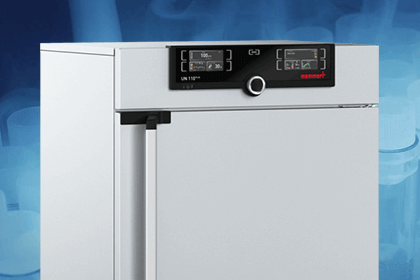What Universal Lab Ovens Are Used For
The universal oven is Memmert’s classic appliance for heating and drying. Air circulation is controlled by a fan or by convection. The former improves the uniformity of temperature and the latter is best for samples that might be disturbed by moving air. Models with TwinDisplay allow the user to set up more complex operations and processes.
Universal Oven Uses
Memmert universal ovens are the first choice in applications where precise temperatures are the difference between success and failure. They are used in a wide variety of industries such as pharmaceuticals, healthcare, product development, food science, and anywhere material testing is required. These industries often use processes that result in unique outcomes and require specific features and capabilities.
Memmert universal ovens are commonly used in the following applications. In the examples below, the processes are complex and the knowledge required to achieve the desired end result is extensive.
Curing
Curing is a process that makes a substance harder and more stable. This process can take place through a chemical reaction with additives or physical action such as evaporation. Curing often requires maintaining a precise temperature in exact conditions. Most of us think of curing when it comes to food. But many of us are not aware that curing is an important process for silicone medical devices such as ear implants. Before silicone can be used for implants it must be cured. However, because the human body is involved, the silicone must be dried in ovens in cleanroom conditions without opening the doors. An Austrian company that manufactures cochlea ear implants keeps more than 80 Memmert ovens running nonstop to accomplish this.
Drying
Commercial drying is the process of removing moisture from products or ingredients in research and production environments. Often the material must be dried rapidly and uniformly in ways that can be exactly duplicated time after time. Typical applications are the drying and heating of pastes, powders, pellets, plant extracts, wax, gel, talc, or granulate for formation and production. A more atypical application involves preparing split logs and wood chips for fuel. The challenge here is to ensure that the fuelwood consistently complies with regulatory standards for moisture content. At the Institute of Wood Technology, they have found that the precise temperature settings and frequent air exchanges of Memmert ovens make this possible.
Sample Storage
Sample storage is important to the food science and pharmaceutical industries. Manufacturers need heated storage of plastics, metal parts and electronic components. Sample storage is used when material needs to be kept at a constant temperature for an extended period of time. But, “even in horse breeding, laboratory equipment is indispensable. In the laboratory of Ludo Philippaerts on the Dorperheide stud farm, the fresh semen of breeding stallions is stored in an oven at 37 °C.” During the equestrian summer break between May and July, breeders test and ship fresh semen, which can command a high price if the stallion is a champion. If samples aren’t stored properly, the breeder is literally throwing money down the drain. The next generation of champion horses is made possible, in part, by Memmert universal ovens.
Performance Testing (Aging)
Performance testing is important in nearly all consumer goods manufacturing, but it is especially important in the automotive industry. So much so that the motto of a wiring and cable distributor is “prevention rather than recall”. Rigorous testing, including artificial aging, has allowed this supplier to produce a consistently high-quality product over several decades. They do it by testing the cables and wiring under extreme conditions. Their universal ovens provide multiple air exchanges per hour, a steady temperature, and even temperature distribution throughout the oven.
Annealing
Annealing is heating something and allowing it to cool slowly in order to toughen it. The annealing process is generally applied to metal, but it can also be used on the colors that are applied to metal parts. A screen printing company takes orders from medical technology and precision engineering customers to provide this service. These industries require prints to have especially high wear resistance to withstand repeated sterilizations, so the print colors are annealed in a Memmert universal oven.
Tempering
Tempering is a heat-treating process that is used to make materials like glass or plastic stronger. Tempering is used in the production of mechanical and electronic components. It is also used in the production of optical lenses, both glass and plastic. Plastic is the optical material of the future because it is easier to work with than glass and lasts longer. “In order to defuse tensions in plastics, to increase form stability, to minimize the danger of crack formation and to degas undesired volatile substances, the plastic components are tempered for 24 hours in a Memmert drying oven after injection molding and other processing steps such as coating.” Plastic has to be tempered at temperatures between 90 and 95° C. If it’s hotter than 95° the plastic will become gooey and unusable.
In each of the use cases above, the success of a product is dependent on controlled air exchange, consistently even heat throughout the oven, precise temperatures, and sturdy and long-lasting equipment. An “oven with a volume of 749 liters is surrounded on all sides by 52 meters of heating elements. Six heating circuits are controlled separately from one another so that the required temperature is exactly attained and maintained at every point in the interior…the heating doesn’t simply switch off when the set temperature has been reached but the temperature is controlled permanently, gently, and evenly throughout the entire chamber.” In addition to these must-haves, Memmert ovens are easy to clean, easy to program, and easy on the eyes. Your oven will run for many years — accurately and reliably — just as you need it to.
